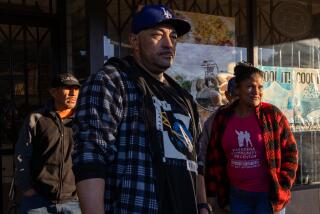Congress Must Help Child Workers
- Share via
Millions of workers, including huge numbers of youngsters, have joined forces with employers in what the government estimates is a $600-billion scam called the underground economy. Last year, they cheated the government out of up to $100 billion in unpaid taxes.
By the end of next year, taxes not collected from those in the swelling underground economy will soar to an estimated $127 billion, according to reports from the Internal Revenue Service.
Workers--mostly in low-income brackets--go along with the scam to keep every penny they earn by evading taxes. Since their real income is steadily declining, their conduct may be understandable, but it’s illegal.
However, they also help their dishonest, usually more affluent, bosses avoid such things as Social Security taxes and workers’ compensation insurance and also help them violate federal and state minimum-wage and overtime laws and those designed to protect workers’ health and safety.
Particularly sad is that a significant proportion of the cheaters--no one knows just how many--are youngsters under age 18 who, by going along with the scam, help their slippery employers dodge our country’s badly neglected child labor laws.
Congress didn’t pass any law to protect young workers until 1917, and the Supreme Court ruled it unconstitutional. Another congressional try in 1922 was also dumped by the high court.
Finally, a fairly good law was passed in 1938, and once again employers fought to kill it by appealing to the courts. It took three more years for the Supreme Court to decide that, after all, the Constitution does say it is OK to give special legal protection to young workers.
Unfortunately, little is being done to crack down on anyone in the underground economy, young or old. But Congress is finally beginning to realize that the 50-year-old child labor law is outdated and inadequate.
It is routinely ignored not only by those employers who hide their legal and moral sins in the underground economy but also by otherwise reasonably respected ones, recent congressional hearings disclosed.
The congressional effort to toughen child labor law is being led by a House subcommittee headed by Rep. Tom Lantos (D-Burlingame).
To put teeth in the old law, he and Rep. Charles Schumer (D-N.Y.) have introduced the Young American Workers’ Bill of Rights. They want, among other things, to impose criminal sanctions and authorize private lawsuits against employers whose violations of child labor laws result in death or serious injury to young people.
They want limits on the number of hours that youngsters 16 and 17 can work when school is in session and to put new limits on dangerous jobs that youngsters perform. Nothing radical there, only reasonable.
Last year, the Department of Labor made four highly publicized, three-day nationwide sweeps of fast-food restaurants, garment manufacturers and other companies that employ large numbers of young workers and illegal immigrants. The sweeps revealed that nearly half the employers that were investigated were violating child labor laws.
Those brief sweeps officially confirmed the obvious: Illegal employment of children is rising dramatically. And they dramatized the fact that enforcement of the laws written to protect both adults and youngsters in and out of the underground economy is almost impossible.
The General Accounting Office’s Sarah Jaggar told a congressional subcommittee that the sweeps did give an indication of the scope of the problem: When enforcement of the law was intensified, investigators turned up more than twice as many violations as they normally uncover.
Despite the increasing problem, the Bush Administration cut the Labor Department’s totally inadequate number of investigators to only 878 this year from 961 last year.
It might help to substantially increase penalties against employers who are caught, on the theory that if violators know that it will cost them a bundle, and maybe jail time, they will not casually join the ranks of the scammers.
Last year, maximum penalties for child labor law violations were increased to $10,000 from $1,000, even if the violations were not intentional. But the numbers keep rising.
Maybe one reason is that, during the 1990 fiscal year, the Labor Department couldn’t, or didn’t, find any employer who willfully violated the law, nor did it refer for criminal prosecution any case involving the serious injury of an illegally employed minor, according to Jaggar.
Lantos recognizes the advantages that jobs provide youngsters: They teach them responsibility and offer much needed money for low-income families and extra funds for those in higher-income brackets.
Not unexpectedly, most advantages go to those already advantaged.
The GAO report showed that 54% of youngsters 15 to 17 years old in high-income families had some kind of job, but only 32% of the 3 million kids in low-income families had jobs.
And although half of all white youngsters 15 to 17 had some kind of job, only 28% of blacks and Latinos were able to find work.
But all young workers are hurt if they are cheated out of their earnings, physically endangered by their jobs or if their work significantly reduces the time they devote to education. And all taxpayers lose if the youngsters hide in the underground economy.
Tougher child labor laws are urgently needed to help protect both advantaged and disadvantaged young people, and there is a chance we may get them.
However, Congress must stop ignoring the far bigger problem: the $600-billion underground economy that hurts honest employers and workers of all ages who have to make up taxes that the cheaters don’t pay.
More to Read
Get the L.A. Times Politics newsletter
Deeply reported insights into legislation, politics and policy from Sacramento, Washington and beyond. In your inbox twice per week.
You may occasionally receive promotional content from the Los Angeles Times.










